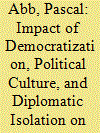| Srl | Item |
| 1 |
ID:
158498


|
|
|
|
|
| Summary/Abstract |
Taiwan’s landscape of think tanks, despite having emerged during a time of Leninist one-party governance and state-led economic development not unlike that in Mainland China, is today marked by a substantial agency in conducting both research and advocacy. This sets them apart from their counterparts on the mainland. We ask how this development was shaped by Taiwan’s evolution as a political entity, especially its experience of gradual political liberalization and eventual full democratization by the mid-1990s. In its wake, multiparty competition, factionalism, the emergence of a vigorous civil society, and individual interest groups created an environment in which think-tank services were sought by many competing actors, offering a wide array of funding opportunities for policy research. Additionally, a political culture that stresses expertise and the need to conduct unofficial diplomacy often gave think tanks a privileged position within the system, and they served as key agents in conducting the kind of informal diplomacy made necessary by Taiwan’s loss of diplomatic recognition from the 1970s onwards.
We further offer an overview of Taiwan’s think-tank landscape, describing major groups (or types) of institutes and briefly portraying especially prominent cases within them. Finally, we provide two detailed case studies to show how these institutes operate in practice, and how the need for unofficial diplomacy and a recent government change have shaped their activities.
|
|
|
|
|
|
|
|
|
|
|
|
|
|
|
|
| 2 |
ID:
148542


|
|
|
|
|
| Summary/Abstract |
Private peace entrepreneurs (PPEs) are private citizens with no official authority who initiate diplomatic correspondence with official representatives from the opposing side during a conflict in order to promote conflict resolution. This article outlines a theoretical framework for analyzing this phenomenon, drawing on a wide range of case studies. It defines the phenomenon and analyzes the power resources and factors that help the PPE influence official processes. The article shows that although PPEs lack official authority and legal status, they have alternative, unofficial resources that help them influence the diplomatic sphere, and some have even played critical roles in conflict resolution efforts. The analysis distinguishes among different means of influence – through official decision makers, public opinion, the rival side, or a third side. The article offers insights about the individual private citizen as an actor in peace diplomacy and describes important historical figures who were excluded from history textbooks.
|
|
|
|
|
|
|
|
|
|
|
|
|
|
|
|
| 3 |
ID:
097014


|
|
|
|
|
| Publication |
2010.
|
| Summary/Abstract |
The diversity of unofficial diplomacy activities in the last three decades has led to extensive attention in theoretical literature to the role of unofficial diplomacy in conflict resolution processes and to the development of a broad range of concepts used to describe different types of unofficial diplomatic activities. Yet certain unofficial activities, such as the process that preceded the Geneva Accords, do not neatly conform to the prevailing unofficial diplomacy concepts. This study seeks to contribute to the theoretical development of the unofficial diplomacy theory through an examination of the assumptions underlying models and concepts relating to unofficial diplomacy as applied to the process leading to the drafting of the Geneva Accords. The study suggests that the unofficial diplomacy process leading to the Geneva Accords was in fact "a quasi track-one" diplomacy-a diplomacy characterized by unique features, some of which weakened its potential contribution to the policy-making process.
|
|
|
|
|
|
|
|
|
|
|
|
|
|
|
|